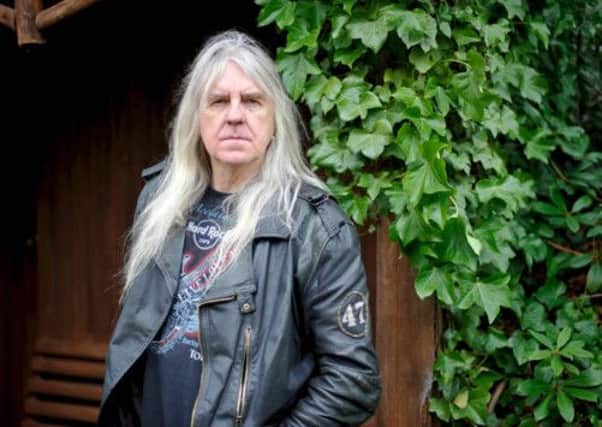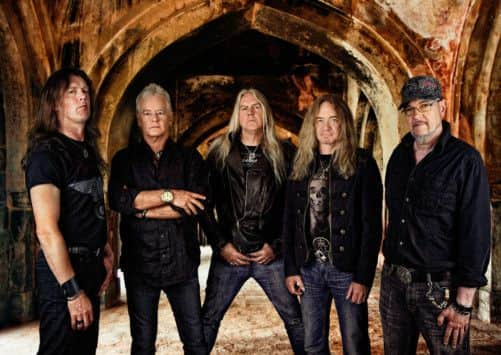The Big Interview: Biff Byford


It’s a different place now to the one he left behind. He is in Whitby,enjoying his maturity and his rediscovered status as one of the county’s most popular musicians. His hard work through the lean years of heavy metal music has paid off.
He is 62 now, and can look back on his musical career with some pride, not least because it stemmed from unlikely beginnings.
Advertisement
Hide AdAdvertisement
Hide AdHis early days were played out to a tune of toil, tragedy and trauma.


But he doesn’t see it that way. Through those hard early years he never lost his sense of wonder and adventure. And now he recalls his childhood with great fondness, and the same sense of awe with which he seems to regard all his life so far.
Peter Byford was born in a stone house in Honley, and when he was tiny his dad, a former miner, got a job in the textile trade and the Byford’s moved to Skelmanthorpe.
This was post war, 1950s Yorkshire. Life was tough but fun, and young Peter spent his days in the rolling countryside, rafting on the river, making tree camps or playing on his own with his model railway and soldiers.
Advertisement
Hide AdAdvertisement
Hide AdIt was standard fare for the time and place until his world was rocked by tragedy when his mother died. It devastated young Peter, a shy child who suddenly had to grow up fast.
He had been very close to his mother, who had played piano and the organ in church. Her memory still lives on: “I was only with her for a short time really so it was very sad, but from what I can remember of her she was fantastic and we were very close but she just…went. In those days life expectancy wasn’t that great anyway.”
While grieving, he went up the road to live with his aunt and uncle, and returned home much too young to face the next challenge, that of looking after his dad, who had lost an arm, ripped off in an accident in a factory.
“Looking back now, I still say my childhood was wonderful. Yes, there were very hard things to deal with, but there are good memories as well as the bad.”
Advertisement
Hide AdAdvertisement
Hide AdBy then he had taken the nickname of his older brother, Michael, who had been known to his peers as Biff.
The younger Biff struggled at school because of his shyness, but loved the music lessons and became friends with a lad whose brother had a guitar.
At the same time someone moved into the house opposite where he lived who had a banjo and he taught young Biff how to play the bass. The seeds had been sown and music began to dominate his life.
But even so, his working career began, again, in typical fashion for 1960s West Yorkshire. After a short spell as an apprentice carpenter, he went to work in the local weaving sheds. And this was where Biff Byford, soon to become a legend in the world of rock, first learned to sing.
Advertisement
Hide AdAdvertisement
Hide AdThe machines would pound all day, clickety-clack, clickety clack. The noise was incredible, and the workers would spend their time trying to lip read each other.
“It was just so noisy in there. It was really heavy metal. The only thing you could do was sing to yourself.”
So sing to himself he did, the melodies locking in place in his head, not to be forgotten.
He soon became bored at work and instead went down the pits, where the pay was better, working a buzzer which controlled the conveyor belts deep underground. He was tall and gangly, and was then given a job shovelling coal into a fire. But music was still his first love.
Advertisement
Hide AdAdvertisement
Hide AdSo he joined a band and began travelling more and more to South Yorkshire, mixing with other would-be musicians in Barnsley and Rotherham and Doncaster.
It was in South Yorkshire that he met Paul Quinn, a guitarist of some repute.
“Paul was a ground breaking guitarist in those days and still is today. I had never heard people play like he did. I played bass then and sang. “
They teamed up with two members of another local band, added a drummer and the final piece was in place.
Advertisement
Hide AdAdvertisement
Hide AdThey changed their name from their original Son of a Bitch to Saxon, and as the New Wave of British Heavy Metal dawned, they were at the forefront.
“We were really into writing our own music and that’s what made us different to the other bands who were doing covers. Everyone wanted Smoke on the Water and other well known stuff but we wanted to do our own thing.
“I was able to bring the melodies from the weaving sheds into the songs. To be a musician you have to give a lot of your life to rehearsing and practising. To get to any sort of level you have to play guitar or sing everyday from the age of 13 or 14 until you drop dead. That’s the life of a musician. You have to commit to it, and we were determined enough to do that.”
Suddenly, albums and hit singles began to flow. Chart success came from the singles 747 (Strangers in the Night), Wheels of Steel, and a song forged in West Yorkshire from a love of steam trains, Princess of the Night.
Advertisement
Hide AdAdvertisement
Hide Ad“I am from the generation that loved steam trains and was always fascinated by them. I used to watch them all the time when I was young.”
Albums including Wheels of Steel, Denim and Leather and Strong Arm of the Law, made Saxon a household name and suddenly they were playing in front of huge crowds as heavy metal fever swept the nation’s young. The band were young, impressionable and more than willing to live the rock and roll lifestyle, and for several years enjoyed themselves while still working hard on new material.
They toured the world, saw their share of debauchery, and Biff looks back almost in bewilderment at the shenanigans they got up to when teamed with bands like Motley Crue in America.
“I was living the dream I’d always wanted. I’d sacrificed so much for this and now, as far as I was concerned, I had it all.”
Advertisement
Hide AdAdvertisement
Hide AdBut like all good things, it came to an end. Almost overnight in the 1980s, heavy metal seemed to lose its lustre and go out of fashion, and splits in the band saw the original line-up change.
Many bands of the time gave up. But Biff was determined. He recharged his batteries by taking time out, concentrating on doing up an old vicarage he had bought in Lincolnshire, and then venturing into property development.
But his heart was always in Saxon and within two years they were back.
Biff and Paul Quinn were still side by side, and Nigel Glockler, a former member of Toyah, was on drums, and the line up was completed by Nibbs Carter on bass and Doug Scarratt on guitar.
Advertisement
Hide AdAdvertisement
Hide AdThey pressed on, writing new material while touring their old hits, and gradually the tide had changed. Fans of all generations were suddenly turning up at their shows, youngsters for the new stuff, and older fans demanding the original hits.
Initially they played mainly in Germany but by 2007, when they released the acclaimed album Inner Sanctum, crowds everywhere were flocking back.
The wave of nostalgia saw the band flourish and last month they released their 20th studio album, Sacrifice, produced by Biff and featuring the normal heavy guitar sound which characterises the band.
Attention has focused on the track Made in Belfast, which looks at the lives of the people building the huge ships from the Belfast shipyards, such as Titanic.
Advertisement
Hide AdAdvertisement
Hide Ad“Writing the lyrics comes easy sometimes but can be very hard. Made in Belfast came about because I have been there many times and I was interested in just how many people spent their lives building these big ships and wanted to write about them. We will keep turning out the new stuff as long as we can. We are professional musicians and this is what we do. I produced the album myself which was very interesting. We’re pleased with it and will be touring it.”
It’s been a long journey to come back to Yorkshire. For a while Biff and his family lived in France but when their house burned down, they eventually settled on the Yorkshire coast.
“I’ve been back in Yorkshire a couple of years. It’s cold but it’s great to be back. We still love playing in Yorkshire. We get a real buzz from playing here.”
He has taken a different and more varied path to most of today’s young musicians but holds no grudges to those who suddenly make it big by appearing on TV talent shows.
Advertisement
Hide AdAdvertisement
Hide Ad“I quite like things like The X Factor. The guy who won the latest one (James Arthur) is great, a real musician. If there’s a shortcut to be taken to get there, then why not take it. But I’m proud of the route we’ve taken. Over the years, there have been great times, and there have been struggles. But it’s all been worth it, in the long run.”
Saxon play the O2 Arena in Leeds on April 24.